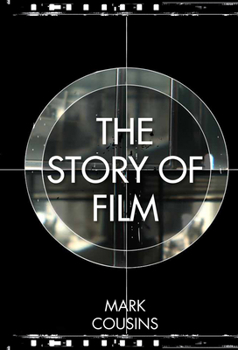The Story of Film
Select Format
Select Condition 
Book Overview
An updated edition of the most accessible and compelling history of the cinema yet published, now also a fascinating 15-hour film documentary 'The Story of Film: An Odyssey'. Film critic, producer and presenter, Mark Cousins shows how film-makers are influenced both by the historical events of their times, and by each other. He demonstrates, for example, how Douglas Sirk's Hollywood melodramas of the 1950s influenced Rainer Werner Fassbinder's despairing...
Format:Hardcover
Language:English
ISBN:186205942X
ISBN13:9781862059429
Release Date:November 2013
Publisher:Pavilion Books
Length:512 Pages
Weight:3.30 lbs.
Dimensions:1.5" x 6.8" x 9.6"
Customer Reviews
2 ratings
Emphasis on Style and Innovation in World Cinema
Published by Thriftbooks.com User , 17 years ago
Mark Cousins' impressive overview of the last 100+ years in world cinema is both engaging and meticulously researched. Unlike the frustrating collective anthology "1,001 Movies You Must See Before You Die", "Story" is very much a personal project; as Cousins writes, his goal is to "open a door to the world of cinema and describe *a* reliable path through it" (emphasis mine). He's quick to point out that many beloved films and directors are missing from the text, and it seems pointless to try to quibble with his selections -- indeed, omissions seem inevitable in such a massive undertaking. With that said, the book is not an entirely successful venture, primarily due to Cousins' frequent references to technological and stylistic innovations which the average reader (even the "intelligent general audience" member he appeals to) will find obscure, and which the more informed reader may quibble with. On page 482, for instance, he references "the unflattering honesty with which [Nan Goldin] films people and her habit of non colour-correcting sodium lighting" -- the majority of readers will have no idea what "sodium lighting" refers to, while photography buffs will argue that the available natural lighting Goldin relies on is likely tungsten, not sodium. Similarly, on pages 250-251, Cousins mentions that the lens used to film several sequences in Bresson's "Pickpocket" was "50 mm, which approximates human vision"; this estimation is only accurate for 35 mm still photography, but, more importantly, his point will likely be lost altogether on most readers. Ironically, I believe Cousins' explanations would benefit from *less* detail and more strategic scaffolding of the basic ideas he'd like to get across to interested readers. Keeping in mind once again that Cousins very clearly stipulates that he's taking a "certain path" through world cinema, readers should note that many of the selections in his book will not necessarily be enjoyable to the average (again, even the average "intelligent") cinephile. Cousins' appreciation is more that of an art historian than a moviegoer. With that said, it's undeniably refreshing to see the more obscure gems of "third world" cinema given their due, even if most viewers will never find copies to rent. In sum, this meticulously crafted book (albeit one full of typos, which should be addressed before a second printing) will excite and inspire most readers to watch -- and re-watch -- literally hundreds of diverse films. Years after taking my first film appreciation course in college, I've been reminded about the meta-narrative of movies over the ages, about how cinema often reflects diverse sociological concerns, and about how directors tend to build upon (or diverge from) their predecessors. It's an exciting story, and Cousins is a worthy, dedicated storyteller.
Good Book, Cheezy Cover
Published by Thriftbooks.com User , 17 years ago
I was looking for a good, current history of world film and ran across this one in the bookstore. The cartoony cover and the Jack Sparrow image made me immediately doubt whether this would be the serious overview I was looking for so I bought this in tandem with the "Oxford History of World Cinema" which takes rather a more academic and in-depth approach to film than this one. I've been reading this book with pleasure over the last two weeks and can say it has brought a lot of aspects of film watching and appreciation to my attention. The author's style is engaging, weaving fluently through different directors, nations and genres. The focus is on more artistic, groundbreaking and influential works, taking the auteur approach - focusing more on the directors than actors or other facets of cinema. That's probably what I like most about this book, that it's a celebration of great artists, treated with great care and enthusiasm. The author's love of cinema and his passion for the art is evident throughout. I'd say the average reader ought to have a decent viewing history to fully appreciate the book, say, at least the knowledge of some films from the likes of Pasolini, Bergman, Dreyer, Wilder, Ozu, etc. to fully appreciate the book, although no one genre, film or director is taken too in depth as it goes for a wider scope. The text is augmented by beautiful stills, much of it to highlight visual and technical changes throughout cinematic history. The physical quality of the book is great, with glossy pages and photos (If it weren't for that horrid cover art!) On the not-so-positive side I was surprised to see Cassavettes barely mentioned and Peter Watkins' total omission from the book (which would support Watkins' and others' claim that he is the most marginalized director of the latter half of the twentieth century). There are many who consider Watkins the most important British director of his generation. How can the author slight such artists in a serious historical survey? The other complaint I have are the atrocious number of spelling errors of a very basic variety. It bcomes slitely anoyying aftar a wile. If you're looking for a more technical, in depth or academic approach, then I'd suggest "Oxford History of World Cinema", but I think you'll find "The Story of Film" a more accessible and enjoyable read. Content: 4 stars Cheesy Cover Art (which almost certainly wasn't the author's idea): 1/2 star






